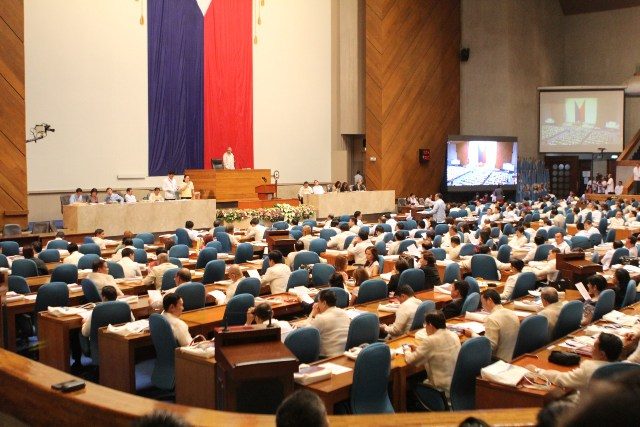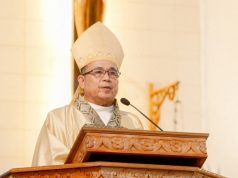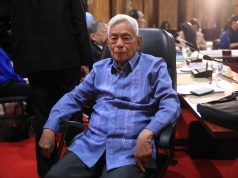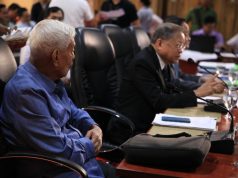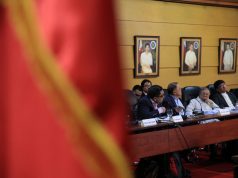Former Senate President Aquilino “Nene” Pimentel, Jr. urged the people on Friday not to leave the matter of the shift of government to federalism “to the devices of our lawmakers alone.”
According to him, it is the Filipino people who should ultimately decide whether or not to pursue the shift to federalism. This is why the people must inform themselves about it and make their voices heard by the lawmakers, so that it is their will that gets embedded into the new Constitution.
At the launch by the Ateneo School of Government and the Ateneo de Manila University Press of Debate on Federal Philippines: A Citizen’s Handbook, Pimentel added: “Tell them what to do. We have to make sure that they get to hear the voice of the people.”
He urged senators and congressmen to go to the farthest corners of the Philippines and conduct public hearings on the issue so that the attitudes of the people will find their way into the lawmakers’ thinking as they revise the Constitution through a constituent assembly.
Pimentel was one of the co-authors of the Local Government Code of 1991, and is a known advocate of federalism.
But, he noted, “our proposal to adopt the federal system is not written in stone like the Ten Commandments.”
“Hindi nakataga sa bato, not even sa ulo ni Bato (Not even on the head of Bato),” he quipped, alluding to the clean-shaven Chief of the Philippine National Police (PNP), Director-General Ronald dela Rosa, whose nickname is “Bato”.
Before the Constitution is amended to adopt federalism, said Pimentel, “the people will still approve or reject it through a plebiscite. It still requires the participation of the people. Are you for it, or not? Ultimately, the people will have to decide.”
So, if the people are to decide with discernment, Pimentel said, it is vital to participate in discussions and read up on books such as the one featured at the Ateneo event.
In essence, Pimentel explained, federalism is a way to “provide a workable, doable, and practical solution to the continuing concentration of the powers of government in the highly centralized system of government that we now have, so that we can solve the… problem, particularly of the rebellion of our Muslim brethren in parts of Mindanao, and hopefully the rebellion also of our brethren in the NPA, and thereby speed up the development of the country.”
Federalism is intended to address the long-standing conflicts and inequality through the sharing of political power. “It’s very difficult to talk about development when all you hear are bullets whizzing by your ears,” he added.
“We’re talking here of power. And we cannot just leave power in the hands of the centralized system of government because, otherwise, the rest of the nation will be disempowered from having a chance to develop their own communities according to what is best to their people, as determined by them, without the central government poking its fingers into attempts by local governments to adopt this kind of development effort,” Pimentel said.
As an example, he said, local government officials could not, presently, simply invite investors to go to their hometowns. They have to ask permission from the National Economic and Development Authority first.
The need to curtail political dynasties, Pimentel said, was urgent: “Political dynasties proliferate in this country because the wording of the present Constitution is quite limited. And what does the present Constitution say? The present Constitution says political dynasties are prohibited in accordance with law, period. Who’s going to pass the law if political dynasties themselves control the mechanism of all legislature?” he asked.
He continued, “And therefore when we revise the Constitution… we have to spell out, what do we mean by political dynasties? Spell it out, meaning a father or a mother who is in public office cannot pass on the matter of his or her authority, or to the husband’s wife, daughter, mistress, whatever …”
“If we adopt a federal system of government, we had better make sure that, since we are revising the Constitution to adopt the federal system, we might as well put a provision also in that Constitution that will spell out exactly what we mean by a prohibited political dynasty,” he added.
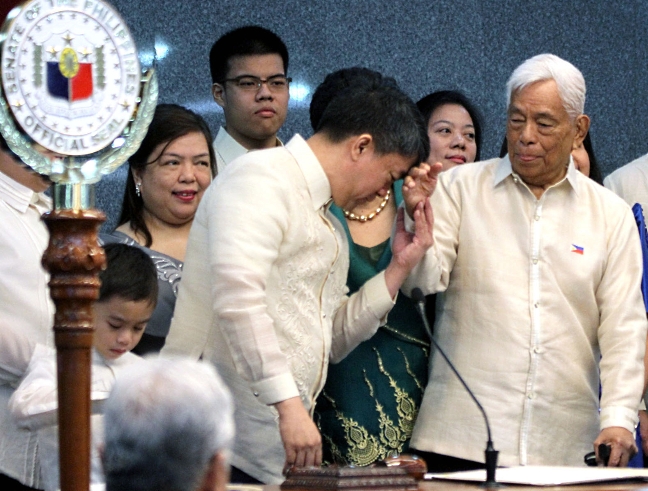
Based on what he has heard in the Senate – with his son, Koko, at the helm as Senate President – the Upper House is considering prohibiting up to first cousins from serving in the government.
He also emphasized that the Philippines must not just blindly copy the federal system of other countries. Rather, it must adopt a system that suits the country’s culture and traditions.
This is why, though he is not “blocking the possibility of incorporating the concept of a federal system with a parliamentary or a semi-parliamentary form of government,” he usually talks about the federal-presidential proposal during discussions because Filipinos are more familiar with it.
However, Florangel Rosario-Braid, a member of the 1986 Constitutional Commission, expressed worry that the shift to federalism is being rushed. The pros and cons must still be considered.
Dr. Julio Teehankee, a professor of Political Science at De La Salle University and one of the authors of Debate on Federal Philippines: A Citizen’s Handbook, nevertheless came to the defense of federalism, pointing out that the country’s “economic geography” has remained the same over the past 40 years.
“The traditionally poor regions of Western Mindanao are left behind,” he said. He pointed out that in 2016, the budget for Metro Manila and Luzon accounted for 56 percent of the entire General Appropriations Act. Meanwhile, Metro Manila, Calabarzon, and Central Luzon account for 62 percent of the gross domestic product, while 14 out of the 17 regions account for only 38 percent of the GDP.
There is a need to mobilize and empower the regions. Federalism enables development of self-government, according to Teehankee. Those who confront the daily problems at the local level will have the power to address these; they won’t need to beg national government.
“We have waited long enough,” he added. Federalism is about “dispersing power from the national to the local”; no longer will the center control local governments through “patronage and clientelism.”

